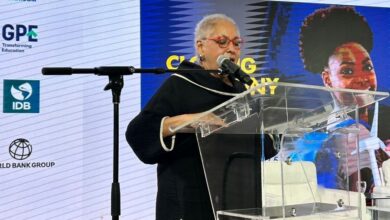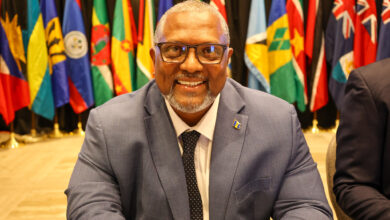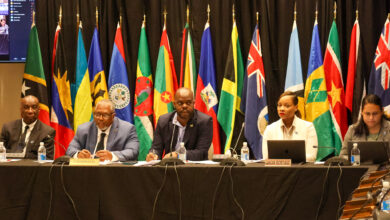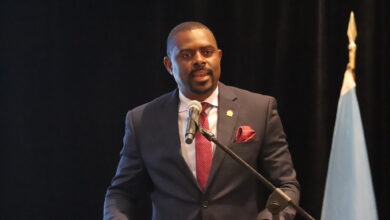Haiti became the Caribbean Community’s newest member on 2 July 2002 some four years after provisional membership had been granted.
In October 2007 the CARICOM Representation Office in Haiti (CROH) was established with the mandate of assisting the Government of Haiti to implement the terms of the CARICOM Single Market (CSM) as early as possible. The CROH operates as part of a project, funded by the Government of Canada, termed the “CARICOM Trade and Competitiveness Project (CTCP) in the CARICOM Region”.
With the support of the CROH, the French-speaking member of the Community was poised to accede to the CARICOM Single Market when disaster struck in the form of a catastrophic earthquake of 12 January 2010.
Since then a number of developments have impacted on that country’s reconstruction and re-development. Principal among these are a protracted presidential and legislative electoral process; slow disbursement of funds pledged by the international community; failure to augment and strengthen the administrative and implementation capacity of Haiti and the negative impact of tropical storm-Tomas-in July 2010. The October 2010 cholera epidemic which though in decline, also impacted Haiti’s already displaced population.
CARICOM has sought to support its Member State in respect of each of the abovementioned challenges, guided by the principle that Haiti should take the lead in its reconstruction and redevelopment.
In this regard, CARICOM’s focus has been placed on assisting Haiti to rebuild its institutional and administrative capacity which, already weak, was further depleted by the loss of key personnel to the earthquake.
CARICOM activity in support of Haiti is being facilitated by the Office of the CARICOM Special Representative on Haiti (OSR) headed by former Jamaican Prime Minister the Hon PJ Patterson, the CARICOM Secretariat CARICOM Haiti Support Unit (CAHSU), and the CROH which, in collaboration with CARICOM Institutions, such as the Caribbean Development Bank (CDB), the Caribbean Association of Industry and Commerce (CAIC), and the Caribbean Agricultural Research and Development Institute (CARDI) have been providing support on behalf of CARICOM Member States
International donors such as Australia, Canada, Japan and Spain, as well as the CARICOM Secretariat and other CARICOM institutions, have been anchoring the Community’s support for institutional and administrative capacity-building. However, the sustainability of ongoing efforts is a matter of concern unless there is additional donor support and Haitian-led reform of systemic institutional weaknesses.
CARICOM Member States supported by the CARICOM Special Representative’s Office have been tireless in their call for the international community to respect the priorities of the Haitian Government with regard to re-development and have urged those which have not yet done so to disburse the resources pledged in support of those efforts. There has been a call from certain quarters, including from the Special Representative, for efficacy on the part of the Interim Haiti Reconstruction Commission (IHRC) in order to accelerate the process of the identification and implementation of projects to support Haiti’s reconstruction efforts. For its part, the United Nations Security Council (UNSC) debated on “Questions Concerning Haiti” on 6 April 2011. The debate presented the opportunity for CARICOM to reinforce the call for the international community to provide resources to strengthen and empower the Haitian Government’s institutional structure and capacity.
In his address on that occasion, outgoing President of Haiti, H.E. Rene Preval, exhorted the UN to transform MINUSTAH’s engagement in Haiti to address the devastating impact of endemic poverty. He urged that “…Tanks, armoured vehicles and soldiers should have given way to bulldozers, engineers, more police instructors, experts in support (of) justice and the penitentiary system”.
If heeded, President Preval’s call has implications for the future role of MINUSTAH in Haiti.
With regard to Haiti’s electoral process, CARICOM’s assistance included participation in observing the presidential and legislative elections of November 2010 through a joint mission with the Organisation of American States, the OAS/CARICOM Joint Electoral Observation Mission (JEOM). The Mission was headed by the Assistant Secretary-General, Foreign and Community Relations, CARICOM Secretariat, Ambassador Colin Granderson. Following a troubled first round of elections, the Haitian Government requested the deployment of an expert mission by the OAS under the leadership of the JEOM to verify the tabulation of the preliminary results of the presidential elections. This exercise resulted in the recommendation to exclude a large number of fraudulent votes and the consequent elimination of Jude Celestin, the ruling party’s candidate, from the second round of elections held on 20 March 2011, and his replacement by the candidate who had initially been placed third, Michel Martelly.
The arrival in Haiti of former Presidents Jean Claude Duvalier on 16 January 2011 and Jean Bertrand Aristide on 17 March 2011 spurred intense but short-lived media coverage but did not in any way disrupt the electoral process contrary to the alarm that had been raised by some countries. Both maintained a low profile and their impact on the electoral process, if any, has been difficult to ascertain. Legal action is being taken against Mr. Duvalier by the Government of Haiti as well as in response to renewed complaints by victims of the Duvalier dictatorship.
The second round of the elections contested by former Haitian First Lady, Mirlande Manigat, and Haitian musician, Michel Martelly, for the Presidency, was markedly improved to the first one in all respects. Preliminary results of the second round of election announced by Haiti’s Provisional Electoral Council on 4 April 2011 and the final results of the elections were announced on 16 April 2011 acclaiming Michele Martelly as Haiti’s President Elect. The new President of Haiti is expected to be inaugurated on 14 May 2011.
While regional and international attention has been on the presidential election, Haitians also voted for a new lower house of Parliament and a third of the members of the Senate. The composition of the legislative branch is crucial in terms of the governance of the country as, under the Haitian constitution, it is the legislative branch, and not the President that ultimately decides on who becomes the Prime Minister and forms the Government. According to the Constitution, the President must choose a Prime Minister from among the members of the majority party in the Parliament. When no party has a majority in the Parliament, the President must choose his Prime Minister in consultation with the President of the Senate and the President of the Chamber of Deputies. In either case the choice must be approved by the Parliament.
The results of the first round of the elections on 28 November 2010 had pointed to the likelihood that the current ruling party – INITE-UNITY – would have dominated the Legislature and so form the next Government. However this did not materialise. While INITE will be the largest party in both Houses, it will have an absolute majority only in the Senate where it will have 17 of the 30 Senate seats. The line up of the other parties in the Senate is: Alternative 7; AAA 3 and others 3.
In the Chamber of Deputies, INITE is likely to hold as many as 40 seats, Alternative 14, AAA 9, ANF 7, and Lavni 7. The other seats are spread between a range of smaller parties and groupings including the President Elect’s Reponse Paysan with only 3 seats. It should be noted that about fifty (50) parties and groups contested the legislative elections.
The new Haitian Government will therefore have to be formed as a result of negotiations between the President and the Legislature, bearing in mind that INITE will have a commanding voice given its hold of the Senate and its superior number of seats in the Lower House. President Elect Martelly has already called for a harmonious relationship between the Executive and the Legislature, stating at a Press Conference that the newly elected Executive and the Legislature did not receive a mandate from the people to confront one another but to work for the development of the country.
In his first message as President Elect, Michel Martelly promised to be a President of all Haitians but confirmed that he was committed to change in all sectors of Haitian life since the Haitian people had voted for change in the practice of politics, in their economic choices and in social organisations.
The President Elect also announced a desire to work with the international community for the good of Haiti, acknowledging that it was action by the international community that had led to the vote of the people being respected.
The new President will inherit the challenge of leading Haiti’s reconstruction efforts among many other priorities and will require the Community’s full support in these efforts.
In other areas, CARICOM’s support has been making progress. The Non-Reciprocal Preferential Access into the CARICOM Market for Certain Haitian Goods for a Period of three years became effective 1 January 2011 and by March, Haiti, with the support of the CARICOM Representation Office in Haiti, had put in place the necessary administrative arrangements for the commencement of the trade.
CARICOM has been active in mobilising and facilitating the Region’s private sector in support of Haiti’s re-development. In this regard, the initiative for the creation of the one billion United States Dollars (US$1B) CARICOM-Haiti Fund is timely. Similarly, efforts to facilitate the movement of Haitian businessmen through the implementation of visa waivers are progressing.
The Community has had to revamp its initial plan to support Haiti’s fight against cholera in view of the decline of the disease and Haiti’s new focus on further containing the spread whilst increasing the environmental health standards of communities.





